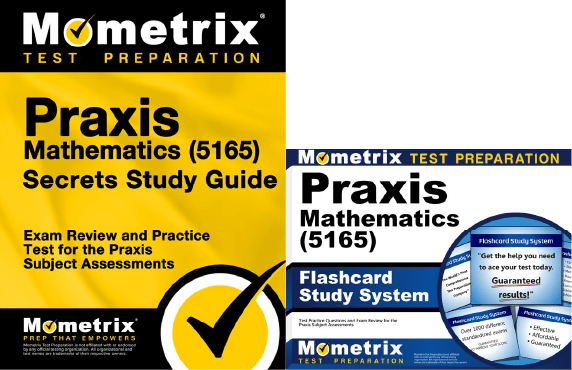If you need help studying for the Praxis Mathematics test or just want some more information about what the test is like, you’ve come to the right place!
Click below to take a free Praxis Mathematics practice test!
What’s on the Exam?
First, let’s talk about the questions on the Praxis Mathematics test. There are 66 questions in total, some being selected-response and others being numeric entry.
Selected-response questions can appear in several different forms:
- Single-selection multiple-choice
- Selecting ALL correct answers from a list of choices
- Selecting the correct answer from a drop-down menu
- Clicking parts of a graphic such as a map or a chart
- Dragging and dropping answers into a targeted area on the screen
Numeric Entry
Numeric entry questions involve entering numbers into answer boxes, rather than selecting an answer out of multiple choices.
Let’s take a closer look at the different sections of the Praxis Mathematics test:
1. Number & Quantity and Algebra
20 questions
- The structure of the real number system
- Properties of radicals and rational exponents
- Quantitative reasoning
- The structure of the complex number system
- Writing algebraic expressions in equivalent forms
- Creating equations and inequalities that describe relationships
- Varied techniques used to solve equations and inequalities
- Varied techniques used to solve systems of equations and inequalities
- Rate of change of nonlinear functions
- Extracting and interpreting information about linear equations when presented in various forms
- The relationship between zeros of polynomial functions and factors of the related polynomial expressions
- Rewriting rational expressions
- Justifying the reasoning process used to solve equations
2. Functions and Calculus
20 questions
- Functions and function notation
- Analyzing function behavior
- Using functions and relations to model relationships between quantities
- Obtaining new functions from existing ones
- Differences between linear, quadratic, and exponential models
- Using logarithms to solve problems
- The relationship between points on the unit circle and the values of trigonometric functions for any given angle measure
- Using trigonometric functions to model periodic phenomena
- The meaning of a limit of a function
- Calculating limits of functions and conditions
- The derivative of a function as a limit, as the slop of a line tangent to a curve, and as a rate of change
- The relationship between continuity and differentiability
- How and when to use standard differentiation and integration techniques
- Analyzing the behavior of a function
3. Geometry
13 questions
- The properties of lines and angles
- The properties of triangles, quadrilaterals, and other polygons
- Transformations in the plane
- Congruence and similarity
- Proving geometric theorems
- Applying trigonometry to triangles
- Applying theorems about circles
- Using coordinate geometry to describe properties of geometric objects
- Solving problems involving perimeter and area
- Solving problems involving solids
4. Statistics and Probability
13 questions
- Making inferences and justifying conclusions
- Summarizing, representing, and interpreting data collected from measurements on one or more variables
- Creating and interpreting linear regression models
- The concept of independence
- Computing probabilities of compound events
- Finding probabilities involving finite sample spaces and independent trials
- Making informed decisions using probabilities and expected values
- Normal distributions
How to Register
To register for the test, you’ll need to create an account on the ETS website. Once your account has been created, you can submit your application to take the test.
When you submit your registration, you will need to pay the $130 testing fee.
The good news is that you might be able to get a fee waiver, if you meet ALL of these requirements:
- You are receiving financial aid
- You are an enrolled undergraduate or graduate student
- You can provide a current FAFSA Student Aid Report that shows an Expected Family Contribution (EFC) of $3,000 or less
- You are required to take the test by an authorized score recipient
Praxis Scores
The Praxis Mathematics test is scored using a scaled scoring method. Here’s how it works:
For every question you answer correctly, you get one point added to your raw score. At the end of the test, your final raw score will be converted to a scaled score. This scaled score will range somewhere between 100 and 200.
The reason your raw score is converted to a scaled score is because everyone that takes the test is given a slightly different set of questions. Since everyone has a different arrangement of questions, and because some questions are harder than others, converting your raw score to a scaled score ensures a more even playing field.
Receiving Your Score
When you receive your skill report, it will tell you how many questions you missed in each section and generally whether you passed or not.
Your scores will become available on your Praxis account on the score reporting date. When you get the score back depends on the testing date.
Online Praxis Mathematics (5165) Prep Course
If you want to be fully prepared, Mometrix offers an online Praxis Math prep course. The course is designed to provide you with any and every resource you might want while studying. The Praxis Mathematics (5165) course includes:
- Review Lessons Covering Every Topic
- 500+ Praxis Math Practice Questions
- More than 400 Digital Flashcards
- Over 220 Instructional Videos
- Money-back Guarantee
- Free Mobile Access
- and More!
The Praxis Mathematics (5165) prep course is designed to help any learner get everything they need to prepare for their Praxis Math (5165) exam. Click below to check it out!
FAQs
How many questions are on the Praxis Mathematics exam?
The exam contains 66 questions.
What is the time limit for the Praxis Mathematics exam?q
The exam is timed at 3 hours.
What is the passing score for the Praxis Mathematics exam?
The passing score for most states is 159.
How much does the Praxis Mathematics exam cost?
The testing fee is $130.



 Praxis Math Online Course
Praxis Math Online Course Praxis Study Guide
Praxis Study Guide Praxis Flashcards
Praxis Flashcards

